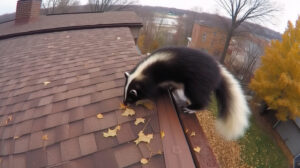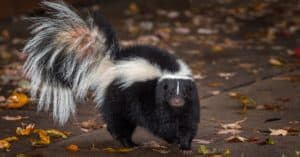You’ve probably smelled that distinctive stinky odor that shows up when a skunk is near. As cute and fluffy as these unique critters are, no one wants to mess with a spraying skunk. This is especially true during the spring, summer, and fall months—but where do skunks go during the wintertime? Do these small but stinky animals stick around and play in the snow, or do skunks hibernate in the winter?
What is Hibernation?
Some animals hibernate during the winter in order to survive when temperatures are freezing, and food is scarce. When animals hibernate, their heart rate, metabolism, breathing, and body temperatures all drop down to minimal levels, putting them in a deep sleep until spring. Hibernating animals don’t eat or drink—in fact, they don’t even get up to use the bathroom! This allows them to save as much energy as possible by staying indoors and avoiding harsh weather conditions. Depending on the species, animals can hibernate anywhere from a few weeks to several months at a time.
Do Skunks Hibernate?
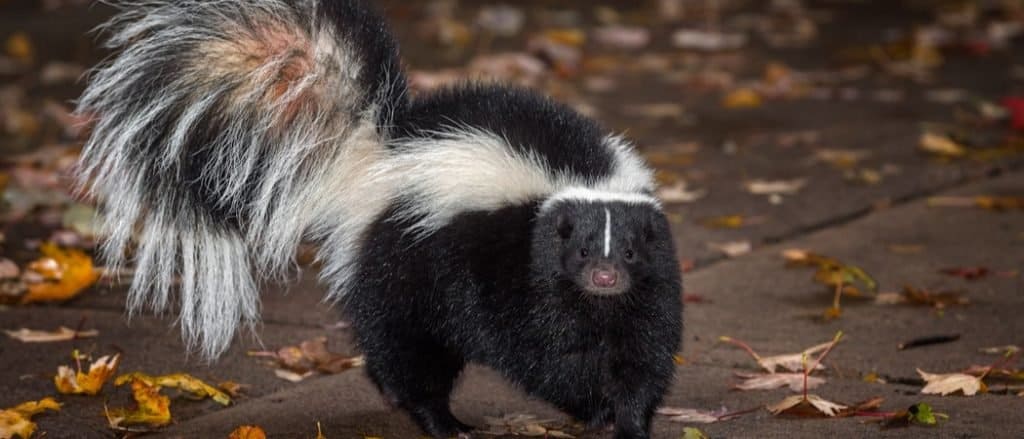
Skunks do not fully hibernate during the winter
©Geoffrey Kuchera/Shutterstock.com
Although they do sleep a whole lot during the winter, skunks do not go into a full hibernation. Instead, skunks go into “torpor”. This is a dormant state where they reduce their metabolic rate and body temperature, and do not move around much. Rather than hibernation, however, torpor is more like a lazy or lethargic sleep. Skunks do get up and move around from time to time, even though most of their winter is spent sleeping.
Like animals who hibernate, torpor allows skunks to save energy when colder weather conditions are too harsh for them and there isn’t as much food to be found. Venturing out in the middle of a snowstorm to find food isn’t exactly safe for a small and vulnerable skunk, so torpor allows them to stay at home tucked away in their warm and cozy beds. Every once in a while, they do venture out to find food. However, they can go days at a time without ever leaving the safety of their dens.
How Do Skunks Prepare for Their Winter Sleep?
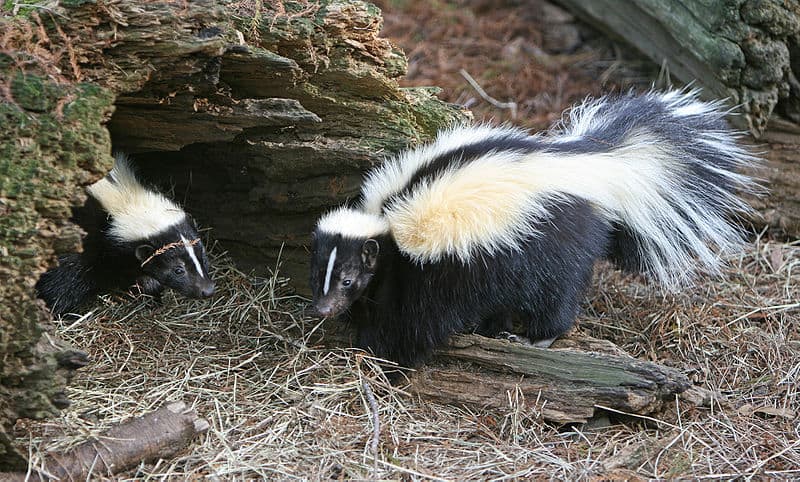
Skunks have a thick layer of fur to keep them warm during the winter
Although skunks do not go into a full-on hibernating mode, they still do a lot to prepare for the long, cold winter season. For example, skunks grow a thick double-layer of fur to keep them warm throughout the winter. The outer coat, or upper guard hair, is somewhat weather-resistant, and grows in much thicker and longer for winter. The underlayer of fur, on the other hand, is fluffy and soft and acts like a built-in insulated blanket, keeping them warm all season long. These two layers of fur help to keep the cold out and the warm in, protecting skunks as they sleep through the winter.
In addition to a thick fur coat, skunks also prepare for torpor by eating—a lot. They are opportunistic omnivores who will eat just about anything from vegetation to meat and even trash! It may seem a bit gluttonous, but their summer feasting is helping to prepare their bodies for a long winter when there much food to go around.
Throughout the summer and fall they overeat to build up an extra layer of fat all over their bodies that not only keeps skunks warm throughout the winter. It also serves as an emergency energy storage for when they can’t go out and find food. Each skunk loses around 30% of their body fat during winter, so they need to make sure to pack it on during the summer!
Where Do Skunks Live During the Winter?
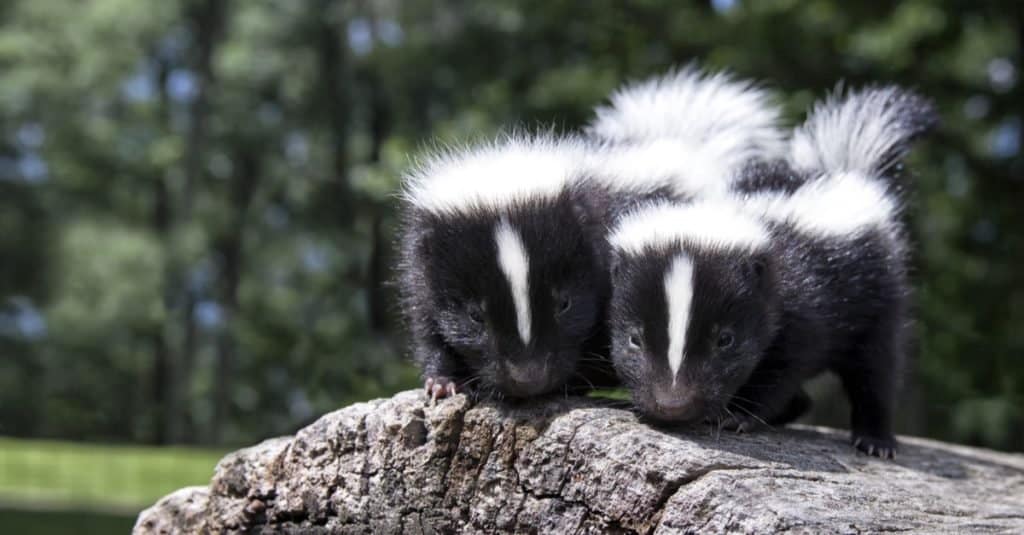
Skunks typically live in underground burrows or hollowed out logs during the winter
©critterbiz/Shutterstock.com
Skunks are burrowers and often dig small dens underground. However, this is not their preferred method of finding a winter home. When available, a skunk will choose to make a den out of a hollowed-out log, woodpile, leaves, or they will repurpose a den abandoned by another animal. Skunks will even share a “communal den” with other skunks during the winter months to stay warm by sharing each other’s body heat.
When a skunk seeks out a winter den, it will try to locate or build one that is in a convenient location. It needs to be warm, protected, and close to food and water. Because of this, skunks in urbanized areas often use human-made areas like under decks and houses, or in woodsheds and basements. Just because you don’t see skunks during the winter, doesn’t mean that they aren’t living right under your nose!
You most likely will not be bothered by a skunk during the winter since they sleep most of the day. However, you should keep an eye out around April and May, as that is when baby skunks are born. A family of skunks may be living in your backyard, and the mother skunk will not be too pleased if you disturb her babies. Do your best to leave the little skunk family alone, and they shouldn’t give you too much trouble. Skunks are not aggressive creatures, so if you do accidentally disturb them, they won’t attack you. Although unpleasant, the mother will likely just spray you and run away.
What Do Skunks Do During the Winter?
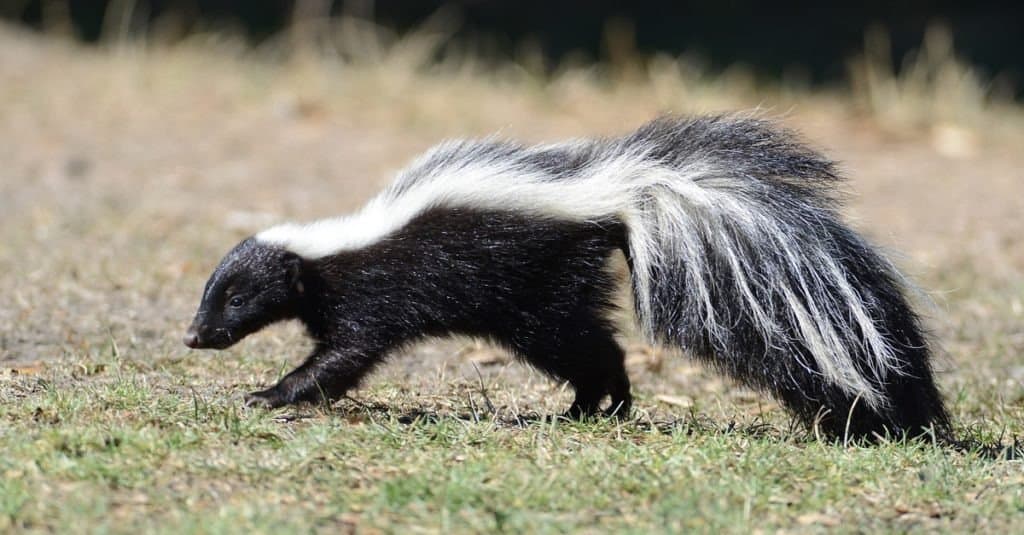
Although skunks spend most of the winter sleeping, they do sometimes come out to forage for food
©Matt Knoth/Shutterstock.com
Skunks spend winter days sleeping, and often sleep through the nights as well. Every now and again, however, skunks venture out of their warm dens to forage for food. When it’s warm in the spring and summer months, skunks mostly eat insects. However these are much harder to find in the cold. During winter they switch to digging around at night for grubs to eat.
Many skunks live solely off grubs during the winter months since these creatures are mostly dormant underground preparing for their own springtime metamorphoses. In addition, skunks also eat small rodents, nuts, berries, and other vegetation.
In urban areas, many skunks will seek out unsecured pet food sitting on a porch, as well as bird seed and trash that has been left outside. If you do not want a skunk rustling around in your yard, make sure to keep these food items secured and protected. It is best to store them with sealed lids, and on a higher shelf since skunks are not very good climbers.
Up Next:
- 10 Incredible Skunk Facts
- 10 Animals That Sleep a Lot
- What’s a Baby Skunk Called + 4 More Amazing Facts!
The photo featured at the top of this post is © Geoffrey Kuchera/Shutterstock.com
Sources
- Academci, Available here: https://academic.oup.com/jmammal/article/98/3/867/3046415
- Science Direct, Available here: https://www.sciencedirect.com/topics/agricultural-and-biological-sciences/hibernation
- Science Direct, Available here: https://www.sciencedirect.com/science/article/pii/S1095643313002225
- Carnivore Conservation, Available here: http://carnivoreconservation.org/files/thesis/hwang_2005_phd.pdf
Thank you for reading! Have some feedback for us? Contact the AZ Animals editorial team.



